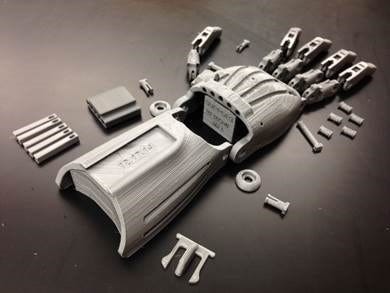Wabash Students 3D Print Hands for Underserved Kids
 The hands have a simple grasping motion to help children complete common tasks.
The hands have a simple grasping motion to help children complete common tasks.
Subscriber Benefit
As a subscriber you can listen to articles at work, in the car, or while you work out. Subscribe NowWabash College is using its newfound 3D printing capabilities to give a helping hand. Students are producing 3D printed prosthetic hands for children around the world through a partnership with a global charity called e-NABLE. Wabash students plan on printing about 20 of the devices in the coming weeks—an endeavor that would have been impossible just a few months ago.
Wabash College believes it’s among the first liberal arts schools of its size to launch a 3D printing center. The school is using a $22,000 grant from Independent Colleges of Indiana/Ball Brothers Venture Fund to establish the 3D Printing and Fabrication Center (3D-PFC) on campus. Expected to become fully operational within a year, students are already using six printers to churn out the prosthetic hands.
“They’re not just printing a little trinket or toy, but something that’s going to make a difference in someone’s life,” says 3D-PFC Director Dr. Lon Porter. “That’s amazing in terms of the student engagement it fosters; they take it quite seriously, because it’s something that matters to them.”
e-NABLE is a global network that organizes hobbyists, professionals and students—mostly in the U.S.—to 3D print prosthetic hands, then gives the free devices to underserved children around the world. Porter says there are about 700 children currently on the organization’s waiting list.
“One of our main missions for the college is to live humanely, and in the sciences, we see that as outreach,” says Porter. “We think this is something that’s very low stakes for us; it doesn’t take a lot of money to do this, and it doesn’t take a huge time commitment on the part of faculty and students. And it’s something that can really enrich the lives of an individual or a family.”
Porter says it only costs the center about $8 to $10 dollars of plastic material to print the hands, and a machine can finish one of the devices in about 10 to 20 hours. e-NABLE provides templates to produce the devices, which have a simple grasping motion to help children complete common tasks like gripping a drink, riding a bike, or swinging a bat.
e-NABLE says the devices can be designed for children or adults who are missing their arms below the elbow, or missing fingers. Because it’s a muscle-assist prosthetic, recipients must have a functional wrist or elbow to provide the flexing motion that pulls the device’s fingers closed.
e-NABLE notes a professionally-made, muscle-actuated hand costs about $8,000, and a child can quickly outgrow the device. The non-profit says its hands can be a shorter-term solution while the child is still growing, before a family might invest in a more expensive permanent device.
“We’re taking students’ native interest in this hot technology and harnessing it in a way that produces amazing gains in learning,” says Porter. “You can take that raw excitement they bring and have them focus it. When they’re excited about something and having a good time, it’s not quite as much ‘work.’”
Wabash student Cordell Lewis began dabbling in 3D printing last school year, and is now fine-tuning his skills by working on the hand project.
“I think knowing I’m helping somebody is exciting,” says Lewis. “3D printing gives you the ability to print anything you want, but I think there should be some focus on a higher purpose—helping people should be top priority.”
Lewis hopes to pursue a career in additive manufacturing, which centers on 3D printing. Porter believes the hand project and the new 3D-PFC will give Wabash graduates an edge in the workplace.
“These are 21st century skills in manufacturing, production and rapid prototyping that I, daresay, are going to become the norm,” says Porter.
The students plan to print the 20 devices during the fall semester—developing cutting-edge career skills, while also lending a hand.
Porter says the newly established 3D Printing and Fabrication Center (3D-PFC) on campus gives students the “output power” needed for the project.
Porter says liberal arts students have a unique perspective on 3D printing.
